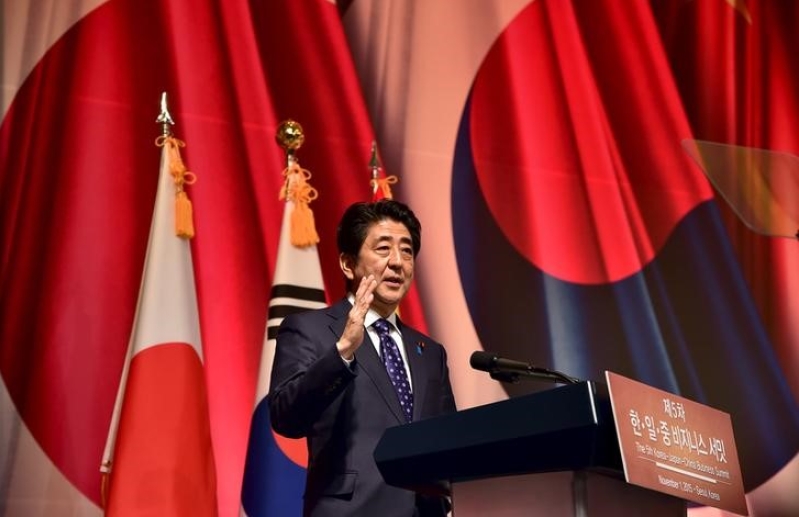
Japanese Prime Minister Shinzo Abe told South Korea's president on Monday he wanted cooperation between the two countries and the United States in maintaining an open and peaceful South China Sea, a Japanese government spokesman said.
Abe has in the past been critical of China's assertiveness in the South China Sea, through which much of Japan and South Korea's trade and energy supplies pass.
"He said Japan would like to cooperate with South Korea and the United States at various occasions to preserve the open, free and peaceful sea," Deputy Chief Cabinet Secretary Koichi Hagiuda told reporters after Abe held talks with President Park Geun-hye of South Korea in Seoul.
Hagiuda did not elaborate, but on Friday, Japanese Defence Minister Gen Nakatani reiterated that Tokyo had no plan to take part in U.S.-led "freedom of navigation patrols" in the South China Sea.
A U.S. warship sailed within 12 nautical miles of one of China's man-made islands in the area last Tuesday in the most significant U.S. challenge yet to territorial limits China claims around the Spratly archipelago.
The voyage triggered an angry rebuke from China and a warning that a minor incident in the area, one of the world's busiest sea lanes, could spark war if the United States did not stop what it called "provocative acts".
China claims most of the energy-rich South China Sea. The Philippines, Vietnam, Malaysia, Taiwan and Brunei have overlapping claims. Japan has long been mired in a territorial dispute with China over a group of tiny, uninhabited islands in the East China Sea.
Abe told Park the situation in the South China Sea was "a common cause of concern for international society", Hagiuda told reporters.
The website of China's official People's Daily on Monday showed pictures of advanced fighter jets from the "naval aviation division" of the South China Sea fleet carrying out drills. It did not say where or when they had happened.
Asked about Abe's remarks, Chinese Foreign Ministry spokeswoman Hua Chunying said that recently "some people" had expressed concerns about the South China Sea, but she did not know why they were worried as there were no problems with freedom of navigation.
"We hope the relevant countries can all view the present issue objectively, fairly and rationally," she told a daily news briefing.
In an apparent effort not to mar an incipient thaw in ties with China, Abe, speaking to reporters in Seoul, declined to specify whether he had raised the issue in bilateral talks with Chinese Premier Li Keqiang in Seoul on Sunday, following a meeting of the three North Asia leaders.
(Reporting by Kiyoshi Takenaka; Additional reporting by Michael Martina and Ben Blanchard in Beijing; Writing by Dean Yates; Editing by Robert Birsel and Nick Macfie)







